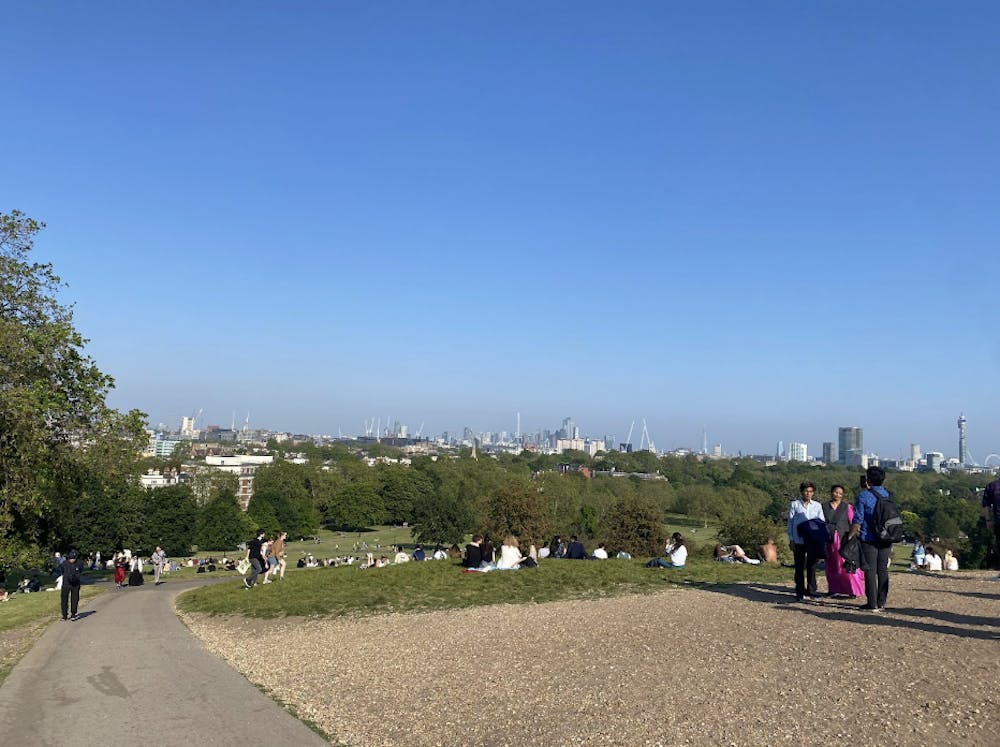I never expected to end up in the United States. When researching and applying to universities, the U.S. seemed like the last place on my list. However, two and a half years later I find myself here, in America. I moved here thinking I would learn about the U.S. But now I can say with confidence that moving to the U.S. has taught me more about Britain than my life in Britain itself did.
I grew up immersed in the British Commonwealth. The U.S. seemed culturally similar, yet at the same time, so different. I remembered learning that it was once a British colony, founded by the people who governed my home in Britain. But this didn’t seem logical. How could the U.S., with all its cultural strength, its music and media permeating everyone’s childhood, have been founded by my countrymen and countrywomen?
America always served as the final frontier. Before moving here, it looked like a massive homogenous monolith. A political, economic and social power. A military giant. It was difficult for me to understand its identity beyond its power projection. However, as Britain proceeded down the route of its slow conversion to Washington’s European vassal state, moving to the U.S. began to appeal to me as I explored my potential university path.
In retrospect, it seems strange that I would not have considered America to be more than what it projected globally. I somehow never conjectured that a country around 4000% bigger than Britain, with a population nearly four times larger than that of the U.K. would have vastly different cultures, experiences and people living within its borders. Barring my understanding of New York (Manhattan, to be specific), and California (Los Angeles, to be specific), the rest of U.S. culture seemed incomprehensible and distant.
I remember my first month in Vermont. I sent my family photos of Walmart, enchantingly large highways and all the varieties of plant-based milk I saw in the supermarkets. I was almost shocked by the difference between Vermont and what I had seen of New York City on television. Was this the same country?
Economically, I began to understand how much the U.S. and Britain differed. The average yearly salary for an American is $63,795. The average yearly salary for a Brit is £33,500 (or roughly $43,000). If Britain were to join the United States as the 51st state, it would have an income per capita lower than that of Mississippi. It feels almost sacrilegious for me to admit, but the U.S. is the country that Britain sought to become. How did two nations, so culturally similar, end up with unrecognizably different economies?
I believe that after the fall of the British Empire, Britain should have gone in a different direction. Mass construction, investment in infrastructure, a housing boom. Instead, we were plagued by NIMBY (not in my back yard) activism and a fascination with our old identity of empire, one that has not been shed. Only when I was able to leave Britain, could I see what was going wrong.
When I interact with Americans, there remains a symbolic strength of Britain. Our cultural heritage can never be denied. Even in the modern era, the popularity of the Spice Girls, the 2012 London Olympics and the craze of One Direction point to Britain's relevance in the anglosphere. I have a working list of British vocabulary that is not used here: chips, loo, lift, jumper, cinema. People grin at the sound of these words. Did you know the word for “billboard’” is typically “hoarding” in England?
However, while we may be culturally relevant, as I examine Britain from afar, I believe we are fading in economic relevance. On the 23rd of June 2016 (or June 23rd as one may say in the U.S.), Britain tragically voted to leave the European Union. Maybe this would be our chance to somehow reconnect with the rest of the former Empire, I thought. Canada, Australia, South Africa, India, Kenya and, of course, the U.S. Maybe they would look at us, and, with feelings of nostalgia, bring us back into their fold. But as Barack Obama once told then British Prime Minister David Cameron, Brexit would put Britain at the “back of the queue” for any potential U.S. trade deal.
Moving to the U.S. has given me a new perspective on my home country. I believe the modern British State should be studied and examined more. Not only by those of us who call it home, but as global economic power shifts away from the West, by anyone looking to see how to keep their countries afloat. Britain's unfortunate economic downturn is a warning of what can happen if a country does not allow its national identity to change.
Yet, even as I gaze across the ocean, I recognise the U.S. is very far from perfect. I spent my first summer here this past June and July. I miss the train system in London. I miss British pub culture. I miss not needing to own a car. I miss using Celsius, and even with its many issues, I miss our free healthcare. But, I believe that it took me moving to the U.S. to really understand the future that Britain is hurtling towards.
So until Britain rejoins the European Union — something I can only hope for — I go into my junior year excited to continue living in America, while quietly reflecting on an ever-changing Britain. I have 19 months left on my visa. Until I have to cross the bridge to my post grad life, I will continue to plow through my American bucket list. Britain will wait for my return. What’s next in America? Costco. I have to try a rotisserie chicken.


